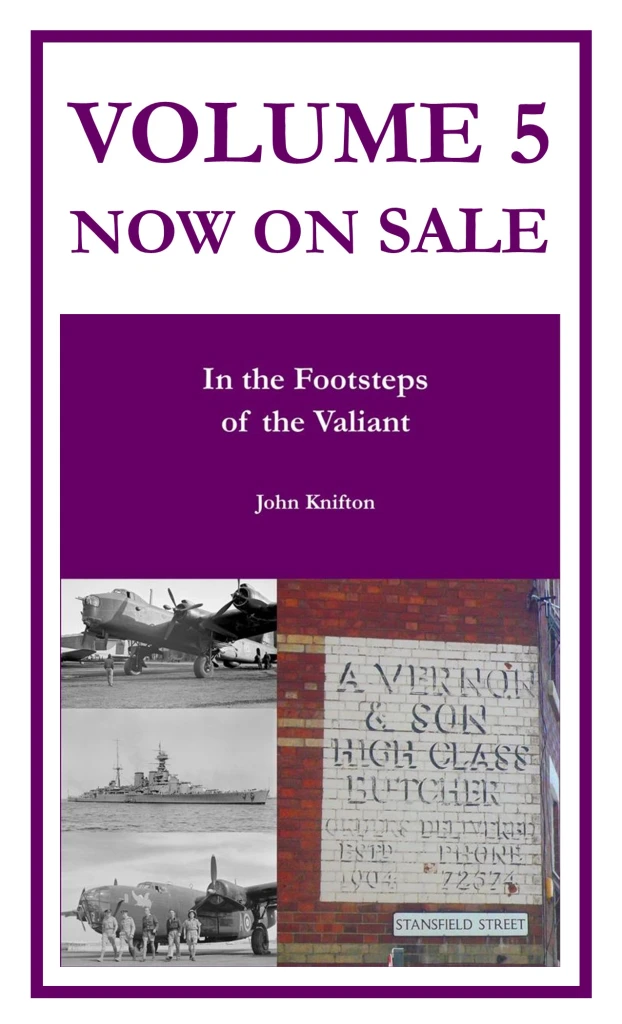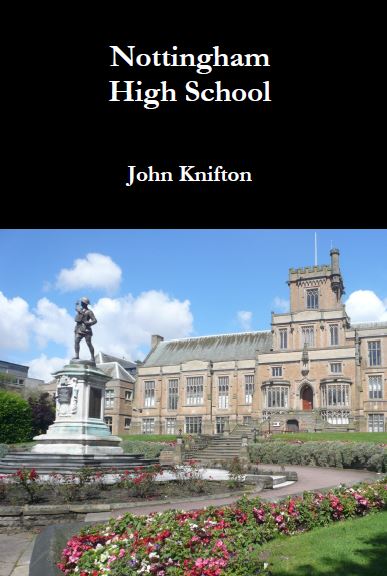By 1941, inspired no doubt in part by the exploits of “The Few” in the previous year’s Battle of Britain, Fred had made up his mind to join the RAF. To do this, he had to walk to the recruiting office in Derby, a journey he had made so many times before with his father to see Derby County play football at the Baseball Ground:
It was a lot less built up and a lot quieter in 1941 than it is now:
Fred duly arrived at a two storey building in the middle of Derby, where all three of the services were busily enrolling volunteers.
As he walked in, Fred was immediately offered a commission as a Second Lieutenant in the Sherwood Foresters, but he refused this generous opportunity and continued on up the stairs to the RAF. Here, he was asked to spell two words correctly, and he had passed their entrance examination. The words were “horizon” and “bicycle”. Fred was now a proud member of the RAF, an organisation which most of the population believed were “the cream of the nation”. He would wear this for the best part of five years:
When Fred returned home, he told his parents what he had done. His father congratulated him on his bravery, but his frightened mother slapped his face, and said “You wicked boy!”
Not everybody saw it in such a negative way. In October 1941, Fred was still working in Swadlincote at the office of Bert Orgill, a local business man, when Colonel Guy German from nearby Ashby-de-la-Zouch called round, and asked about him, perhaps even seeing Fred as a likely recruit for his own regiment.
Mr Orgill said that Fred had recently volunteered for the RAF, and Colonel German generously gave him a five pound note for having done so. Eventually, Fred would look like this:
At this time, as was briefly mentioned above, the RAF was considered to be the élite force of the three, a fact which was strongly emphasized in the personal letter sent to every man who joined the RAF by Archibald Sinclair, the Secretary of State for War. He said that
“The RAF demands a high standard of physical fitness and alertness, and I congratulate you on passing the stringent tests”.
They were also told they had a “great task to perform” and that
“The honour of the RAF is in your hands. Our country’s safety and the final overthrow of the powers of evil now arrayed against us depend on you and your comrades.”
They were encouraged to “keep fit, work hard, live temperately”. Well, two out of three isn’t bad.
Perhaps as a direct result of this generous praise, there were so many volunteers for the RAF that young men were often sent away for up to a year or more, until a place on a suitable training course became available. This may possibly have been what happened to Fred, although, at this late stage, we have absolutely no way of ever knowing the truth, as his RAF records are far from exhaustive, shall we say!
Nobody of Fred’s social class had ever done any flying. Few had ever been inside an aircraft. Hardly any could even drive a car. To have volunteered for the RAF, and to have been accepted, no matter how low he said their standards of spelling may have been, must have suffused him with immense pride. In this, of course, he was not alone. Thousands of young men across the entire nation had read books and magazines about aviation throughout the 1930s and now, as they reached their early twenties, they were only too willing to join the youngest service:
We do know that when Fred volunteered, he was within just a couple of months of his nineteenth birthday. At the age of eighteen, he still had the right to choose which service he entered. Had he waited those last two months, until he was nineteen years old, the government would then have had the right to conscript him, and he would have lost the right to decide in which arm of the services he was to serve.
It is, however, actually possible to disprove one apparently neat theory, namely that Fred, as a keen cinema goer, might well have been inspired to join the RAF by seeing a famous documentary film, which he would talk about ceaselessly in later years. It was entitled “Target for Tonight”.
“Target for Tonight” was a Crown Film Unit propaganda film, using real RAF personnel throughout and chronicling a night raid on Germany by the Vickers Wellingtons of 149 Squadron of Bomber Command, with, coincidentally, “F for Freddie” as the main aircraft. It is a nice idea that Fred was inspired to join the RAF by seeing this film but it cannot be true, as the film was not released until at least October 1941, almost a full month after Fred volunteered. He still spent the rest of his life as an enormous fan of Charles Pickard, the hero of the film:
One thing that Fred was always to joke about, however, was the immediate impact that his joining the Allied Forces was to have on the conflict. Montgomery’s victory over Rommel at El Alamein followed his enlistment reasonably quickly, and not long afterwards, the Soviets were to win the Battle of Stalingrad.
You can watch “Target for Tonight” here:











Wot a gud thing Fred was a gud speler. Colonel German is just too good a name
He left school at 13 like everybody else, although he had passed his 11+ two years before. Like so many children in the 1920s though. his parents couldn’t afford the other things needed to attend a grammar school five miles away…ten bus fares a week, sports kit and above all the school uniform. The very same situation applied to ordinary soldiers as well, because at that time, the uniforms and membership of the Officers’ Mess were, on their own, more expensive than the officer’s ordinary wages.
My Mum made our school uniforms, including the embroidered blazer badges, one of which she borrowed.
REPLY: Well done, Mum! I think that my Granny’s skills must not have extended that far. I can’t remember her ever knitting or sewing.
You seems to have your father’s sense of humour.
One thing that Fred was always to joke about, however, was the immediate impact that his joining the Allied Forces was to have on the conflict. Montgomery’s victory over Rommel at El Alamein followed his enlistment reasonably quickly, and not long afterwards, the Soviets were to win the Battle of Stalingrad.
I think we men all model ourselves, consciously or unconsciously on our fathers. A while ago I wrote an article just for myself called “Why I am what I am” and it was almost scary as to how many features of my dad’s character and particularly his interests I have.
Here are the things I have inherited from him, taken just from the first half of what I wrote: aircraft, being steady and reliable, birdwatching, Charles Laughton, cricket, doing my duty, football, films, French, history, Latin, Nottingham High School, poetry, the Poles, the RAF, Russian, Shakespeare, stamps, the Second World War, teaching, tying my shoes with a double knot and so on.
Fred had quite an impact on the war even before he flew a plane – not bad for an 18-year old!!
He certainly did! If he’d joined up a year earlier, and he could have helped you out with Pearl Harbor!
Having an impact on the war is a strange thing. My Dad was very proud, I suppose, of conquering his fear, getting into that Lancaster, and bombing the enemy on at least nineteen occasions. My father in law was a civilian, but a civilian who helped make the moulds and other equipment for building Merlin aero-engines. Lots of people around Derby did ten hour shifts, six days a week, at the Rolls Royce factory, making those Merlin engines.
I suspect they had more impact on the war than my Dad did, but his job, like the jobs of all his colleagues, and all the members of the armed forces who were “at the sharp end”, was a lot more dangerous. I suppose once you’ve built that Merlin engine, somebody has got to find a use for it!
The war could not have been won without the backing of the home front – a topic today’s public refuses to discuss.
Sounds like the timing of him volunteering for the RAF was impeccable. Looking forward to the next installment.
The next instalment (English spelling!) will recount the thrills and spills of basic training and introduce you to his instructor, Sergeant Parry, a man who, with all his colleagues, was more than willing to explain a whole host of interesting details about saluting, marching and in general, as we English say “Getting your *rse in gear!”.
What a marvellous film, I can see why Fred talked about it so much. The difference between the higher ups and the crew was stark. A little bit of danger but not too much, with the fun and frolics of a close knit crew thrown in, all very jolly hockey sticks!
Absolutely! We don’t seem to have an English film that captures what my Dad used to talk about in his reminiscences. There was a lot of good humour, but he did and saw some ghastly things. Perhaps “Memphis Belle”, the original film, comes closest, but “Target for Tonight” makes it all seem like a difficult away game for the School Rugger XV.
He seemed to have finished the war quite traumatised, the reason perhaps, that he never went back to reunions of the squadron. Actually, he did try a couple, but his verdict was “None of my friends were there, and all the people I wanted to see were probably dead”. I don’t think either that he could talk to people as if what he had experienced was enjoyable and full of good memories. He had spent quite a few years trying to wipe the memory banks clean, as far as I can remember.
In the 1950s the ABC (Australian Broadcasting Corporation) made radio adaptations of Ivan Southall’s “Simon Black Coastal Command.” Here we all learned about Sunderland Flying boats and the Bay of Biscay. I was ten or twelve or thereabouts and it was compulsory listening back in the days before TV. I’m sure if it had been ten years earlier I would have joined up.
From what I have read there were a great many Australians flying Sunderlands from Cornwall and south west Wales during the war years. The Sunderlands had so many defensive guns that the Germans nicknamed the “fliegende Stachelschwein”, the Flying Porcupine. Not the easiest of phrases to work into everyday conversation, but possibly in a restaurant when the waiter comes to take your order or perhaps in the zoo. You could just look up into a blank sky and say WOW! When the German passer by says “What was it?” you can say……..
That is a particularly moving, even poignant, picture of your dad. Every photograph is a reminder of a moment in time. Your dad’s pride in wearing that uniform is very evident. His expression also reveals a certain optimism – surely a necessary disposition given the circumstances. Yet he obviously knew what was in prospect.
Yes, he was always very proud of that photograph which seems to capture the almost naïve optimism of the early war years. I just love how photographs have that ability to capture split sections of long gone existence, especially when you can go back to the original place and see exactly where somebody stood in 1897.
I’ve just found a photograph of the Brincliffe School, a Victorian all girls’ school in Nottingham. It was demolished around 1980 and flattened and ultimately became our school staff car park. Even so, you can still see which bricks in the modern wall were actually the supports for the original entrance gates in 1880 and so on. I suppose human time really flies but not the kind of time experienced by inanimate objects!